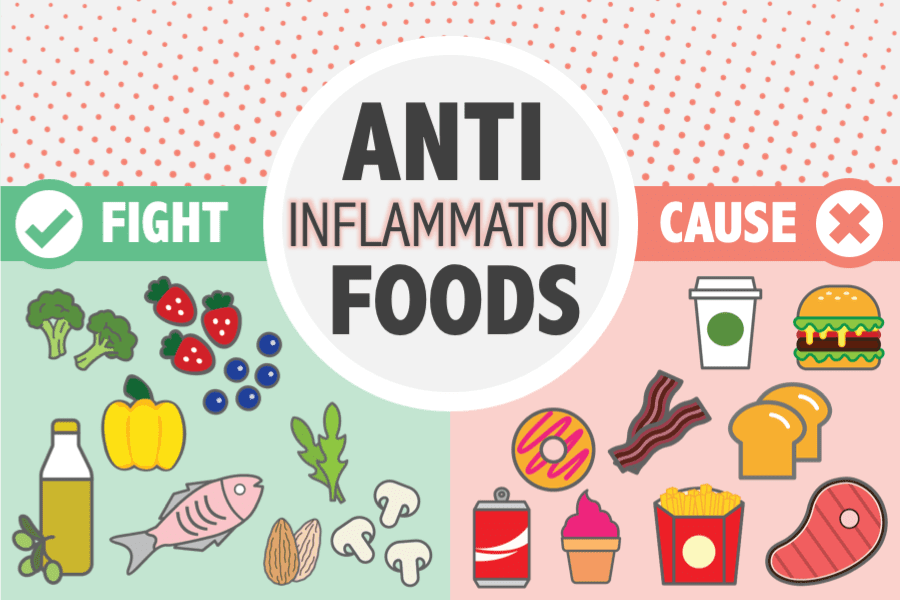The deadly manifestation of chronic inflammation

“The World Cancer Research Fund estimates that some eight million people die from cancer each year. According to statistics from the World Health Organization, about 12.9 million people worldwide died from some form of cardiovascular disease in 2004. Cancer and heart disease, the deadly manifestation of chronic inflammation, are expected to remain as the leading causes of death in developed countries for many years to come,” according to Dr. Thomas Ball at Performance Health Center.
Also suggested is trying an anti-inflammatory diet as an alternative to taking NSAIDs (non-steroidal anti-inflammatory drug), which can be harmful to the body. Not only does the article include natural anti-inflammatory foods but also foods that are known to promote inflammation that should be equally avoided.
For example:
- SUGARS
Substitute: Natural sweeteners like Stevia, honey, or blackstrap molasses sparingly. OK to eat natural sugars found in fresh fruit which also supply vitamins, antioxidants and fiber.
- COMMON COOKING OILS
Substitute: Macadamia oil, or extra virgin olive oil.
- TRANS-FATS
Substitute: Natural peanut butter and foods without the trans-fats.
- DAIRY PRODUCTS
Substitute: Coconut or almond milk. Kefir, or unsweetened yogurt for those not allergic to milk.
- FEEDLOT- RAISED MEAT
Substitute: Organic Free- Range Animals that are fed a natural diet such as grasses instead of grains and hormones contain more omega-3 fats. Having more room to roam freely, they are also leaner and contain less saturated fat.
- RED MEAT AND PROCESSED MEAT
Inflammation-dousing Substitute: You don’t need to avoid red meat totally, though the same thing cannot be said for processed meat. No amount of processed meat is safe. Replace the bulk of your red meat with organic vegetables, poultry and fish, and relegate red meat to a weekly treat. When you do eat red meat, remember to choose lean cuts and preferably, that of grass-fed animals. To reduce the formation of heat generated food contaminants, it is also advisable not to overcook your meat and use moist heat cooking like stewing and boiling more often than high-temperature dry heat methods such as grilling and frying.
- ALCOHOL
Inflammation-dousing Substitute: A refreshing and thirst-quenching glass of pure, filtered water, anyone? How about a cup of anti-aging and anti-inflammatory Japanese green tea? If you find the idea of swapping ethanol for water or tea implausible, limit your consumption to no more than one drink a day.
- REFINED GRAINS
Inflammation-dousing Substitute: Go for minimally processed grains if you are not gluten intolerant or allergic to grains. If you are an avid bread or pastry maker, invest in a grain mill to produce your own flour. It will be much fresher than the stale grain found in stores. When buying cereals or other products made from grains, don’t take the words on the packaging for granted. Just because the box says whole grains, it does not mean the grains inside are 100% intact. The problem is due to a lack of an internationally accepted definition for the word ‘whole grain’. When in doubt, if it does not look close to its natural state, don’t buy it.
- ARTIFICIAL FOOD ADDITIVES
Inflammation-dousing Substitute: Besides limiting the consumption of processed foods, use anti-inflammatory herbs, spices or natural sweeteners to add flavor to your dishes instead of relying on food additives.
- ANY FOODS THAT YOU MAY BE SENSITIVE TO
Inflammation-dousing Substitute: If you suspect that a particular food may be responsible for your food intolerant response, try avoiding it completely for about two weeks and monitor your reaction. At the end of the abstinence period, re-introduce the food back into your diet. If you are in fact incompatible with it, you should be able to notice the difference in how you feel easily.
To learn more click here to read the full article.


